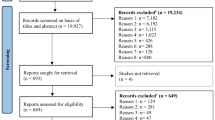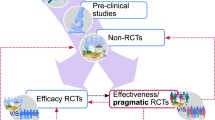Abstract
Background:
Faithful and complete reporting of trial results is essential to the validity of the scientific literature. An earlier systematic study of randomized controlled trials (RCTs) found that industry-funded RCTs appeared to be reported with greater quality than non-industry-funded RCTs. The aim of this study was to examine the association between systematic differences in reporting quality and funding status (that is, industry funding vs non-industry funding) among recent obesity and nutrition RCTs published in top-tier medical journals.
Methods:
Thirty-eight obesity or nutrition intervention RCT articles were selected from high-profile, general medical journals (The Lancet, Annals of Internal Medicine, JAMA and the British Medical Journal) published between 2000 and 2007. Paired papers were selected from the same journal published in the same year, one with and the other without industry funding. The following identifying information was redacted: journal, title, authors, funding source and institution(s). Then three raters independently and blindly rated each paper according to the Chalmers method, and total reporting quality scores were calculated.
Findings:
The inter-rater reliability (Cronbach's alpha) was 0.82 (95% confidence interval=0.80–0.84). The total mean (M) and s.d. of Chalmers Index quality score (out of a possible 100) for industry-funded studies were M=84.5, s.d.=7.04 and for non-industry-funded studies they were M=79.4, s.d.=13.00. A Wilcoxon matched-pairs signed-ranks test indicates no significant rank difference in the distributions of total quality scores between funding sources, Z=−0.966, P=0.334 (two tailed).
Interpretation:
Recently published RCTs on nutrition and obesity that appear in top-tier journals seem to be equivalent in quality of reporting, regardless of funding source. This may be a result of recent reporting of quality statements and efforts of journal editors to raise all papers to a common standard.
This is a preview of subscription content, access via your institution
Access options
Subscribe to this journal
Receive 12 print issues and online access
$259.00 per year
only $21.58 per issue
Buy this article
- Purchase on Springer Link
- Instant access to full article PDF
Prices may be subject to local taxes which are calculated during checkout
Similar content being viewed by others
References
Moher D . CONSORT: an evolving tool to help improve the quality of reports of randomized controlled trials. Consolidated Standards of Reporting Trials. JAMA 1998; 279: 1489–1491.
Mills EJ, Wu P, Gagnier J, Devereaux PJ . The quality of randomized trial reporting in leading medical journals since the revised CONSORT statement. Contemp Clin Trials 2005; 26: 480–487.
Moher D, Jones A, Lepage L . Use of the CONSORT statement and quality of reports of randomized trials: a comparative before-and-after evaluation. JAMA 2001; 285: 1992–1995.
Allison DB . The antidote to bias in research. Science 2009; 326: 522–523.
Allison DB, Cope MB . Randomized controlled trials with statistically nonsignificant results. JAMA 2010; 304: 965.
Cope MB, Allison DB . White hat bias: a threat to the integrity of scientific reporting. Acta Paediatr 2010; 99: 1615–1617.
Cope MB, Allison DB . White hat bias: examples of its presence in obesity research and a call for renewed commitment to faithfulness in research reporting. Int J Obes Relat Metab Disord 2010; 34: 84–88.
Rennie D . CONSORT revised–improving the reporting of randomized trials. JAMA 2001; 285: 2006–2007.
Thomas O, Thabane L, Douketis J, Chu R, Westfall AO, Allison DB . Industry funding and the reporting quality of large long-term weight loss trials. Int J Obes Relat Metab Disord 2008; 32: 1531–1536.
Chalmers TC, Smith Jr H, Blackburn B, Silverman B, Schroeder B, Reitman D et al. A method for assessing the quality of a randomized control trial. Control Clin Trials 1981; 2: 31–49.
Cronbach LJ . Coefficient alpha and the internal structure of tests. Psychometrika 1951; 16: 297–334.
Shapiro SS, Wilk MB . An analysis of variance test for normality (complete samples). Biometrika 1965; 52: 591–611.
Agency for Healthcare Research and Quality. Systems to Rate the Strength of Scientific Evidence, 47, 02-E016, 1-11. US Department of Health and Human Services: Washington, DC, 2002. (evidence report).
Detsky AS, Naylor CD, O’Rourke K, McGeer AJ, L’Abbe KA . Incorporating variations in the quality of individual randomized trials into meta-analysis. J Clin Epidemiol 1992; 45: 255–265.
Thabane L, Chu R, Cuddy K, Douketis J . What is the quality of reporting in weight loss intervention studies? A systematic review of randomized controlled trials. Int J Obes Relat Metab Disord 2007; 31: 1554–1559.
Myers JP, vom Saal FS, Akingbemi BT, Arizono K, Belcher S, Colborn T et al. Why public health agencies cannot depend on good laboratory practices as a criterion for selecting data: the case of bisphenol A. Environ Health Perspect 2009; 117: 309–315.
Klayman J, Ha Y-W . Confirmation, disconfirmation, and information in hypothesis testing. Psychol Rev 1987; 94: 211–228.
Klaczynski PA, Narasimham G . Development of scientific reasoning biases: Cognitive versus ego-protective explanations. Dev Psychol 1998; 34: 175–187.
Hart W, Albarracin D, Eagly AH, Brechan I, Lindberg MJ, Merrill L . Feeling validated versus being correct: a meta-analysis of selective exposure to information. Psychol Bull 2009; 135: 555–588.
Acknowledgements
This work was supported in part by NIH grants R01DK078826, P30DK056336 and T32HL007457.
Disclaimer
The opinions expressed are those of the authors and not necessarily the NIH or any organization with which the authors are affiliated.
Author contributions
David Allison—conceived the project, supervised the execution, designed the analysis plan, and contributed to the drafting and editing of the manuscript. Kathryn Kaiser—managed the resolution of the coding, performed the analysis, contributed to the writing and editing of the manuscript. Stacey Cofield—assisted with selection of the coding system, supervised data collection, assisted with coding scheme and analysis plan. Olivia Affuso—assisted with coding scheme and analysis. Mark Beasley—assisted with analysis, editing of manuscript. All others—scored papers, entered data and provided comments on the manuscript.
Author information
Authors and Affiliations
Corresponding author
Ethics declarations
Competing interests
Dr Allison has received grants, honoraria, donations, royalties, and consulting fees from numerous publishers, food, beverage, pharmaceutical companies, and other commercial and nonprofit entities with interests in obesity and randomized controlled trials.
Rights and permissions
About this article
Cite this article
Kaiser, K., Cofield, S., Fontaine, K. et al. Is funding source related to study reporting quality in obesity or nutrition randomized control trials in top-tier medical journals?. Int J Obes 36, 977–981 (2012). https://doi.org/10.1038/ijo.2011.207
Received:
Revised:
Accepted:
Published:
Issue Date:
DOI: https://doi.org/10.1038/ijo.2011.207
Keywords
This article is cited by
-
Rethinking success, integrity, and culture in research (part 2) — a multi-actor qualitative study on problems of science
Research Integrity and Peer Review (2021)
-
A tutorial on methodological studies: the what, when, how and why
BMC Medical Research Methodology (2020)



